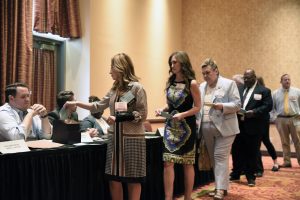Oklahoma Bar Journal
From the Executive Director | Strictly Business: Why We’re Streamlining the 2025 OBA Annual Meeting
By Janet Johnson

Bar business underway at the 2024 Annual Meeting. The 2025 OBA Annual Meeting will take place Nov. 6-7 at the Sheraton Oklahoma Downtown Hotel. More information is on page 61 of the Sept. 2025 issue and online at www.okbar.org/annualmeeting.
Our Annual Meeting has always been one of my favorite traditions – a time to see familiar faces, meet new ones, and feel the shared pride of belonging to this profession. Over the years, it’s been part conference, part reunion, and part celebration.
But just like the practice of law, our traditions sometimes need to adapt to meet the realities of our members’ lives today. That’s why, after a lot of thought and listening to your feedback, we’ve decided to make a change: This year, our Annual Meeting will focus solely on official bar business. I want to share why this change makes sense and why I think it will serve all of us well.
GETTING BACK TO THE CORE PURPOSE
At its heart, the Annual Meeting exists for one reason: to take care of the OBA’s official business. This is the moment when we elect leaders, vote on bylaw changes, hear reports, and make decisions that shape the way we serve members and the public. These aren’t box-checking exercises; they’re the very foundation of our association.
By dedicating the Annual Meeting exclusively to these responsibilities, we can focus on more offerings for continuing legal education and other events throughout the year.
YOU SPOKE, WE LISTENED
Over the past few years, we’ve heard from many of you that while you value the Annual Meeting, the reality is that busy calendars and long travel days make it hard to attend. Many members prefer to complete CLE on their own schedules or at different times of the year. Others have said they’d like to separate the business of the association from the educational and social parts of our community.
By streamlining the Annual Meeting, we are making it easier for more members to participate in the governance process without committing to a multi-day conference. You can attend for this core purpose – the decision-making – and fit it more easily into your schedule.
PUTTING RESOURCES WHERE THEY MATTER MOST
Hosting a large, multi-track event takes significant time, money, and staffing. By narrowing the scope, we can still meet our governance obligations while freeing up resources to invest in things you’ve told us matter:
- More CLE options throughout the year
- Technology upgrades that make participation easier
- Programs and services that directly support our members’ professional needs
This isn’t about doing less – it’s about focusing our time and resources where they’ll have the most impact.
STRENGTHENING THE CONNECTION
CLEs, section meetings, and networking events aren’t going away. In fact, by separating them from the Annual Meeting, we can host more of them, in more locations, and in formats that work better for different kinds of schedules. We’ll have more flexibility to offer programs when they’re most relevant – whether it’s a brand-new piece of legislation, an emerging area of law, or an issue members want to dive into right now.
LOOKING FORWARD TOGETHER
I know changing a long-standing tradition can feel different, but it’s also a sign of a healthy, adaptable organization. This new approach will help us govern more effectively, engage more members, and make smarter use of our shared resources.
I look forward to seeing you at this year’s Annual Meeting – ready to focus on the important work of shaping our bar association’s future. And I look forward to seeing you at CLEs, section events, and other gatherings all year long.
After all, the Annual Meeting may be just two days, but our connections as colleagues last all year.
To contact Executive Director Johnson, email her at janetj@okbar.org.
Originally published in the Oklahoma Bar Journal – OBJ 96 No. 7 (September 2025)
Statements or opinions expressed in the Oklahoma Bar Journal are those of the authors and do not necessarily reflect those of the Oklahoma Bar Association, its officers, Board of Governors, Board of Editors or staff.
